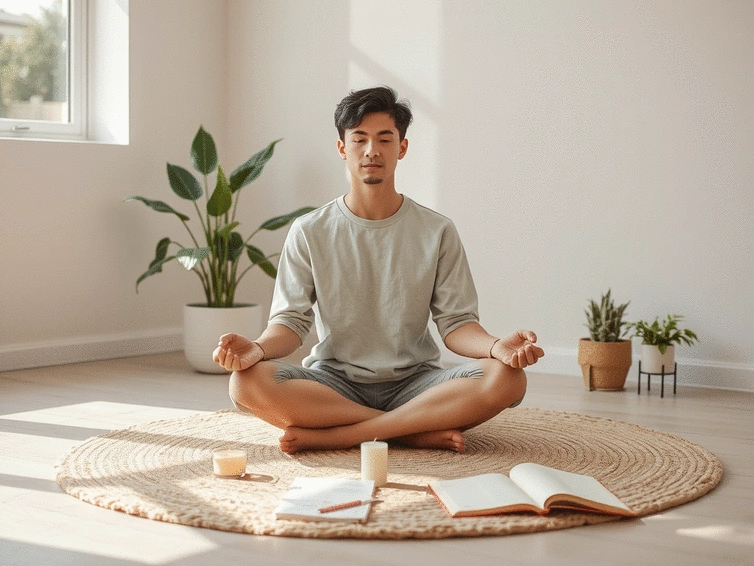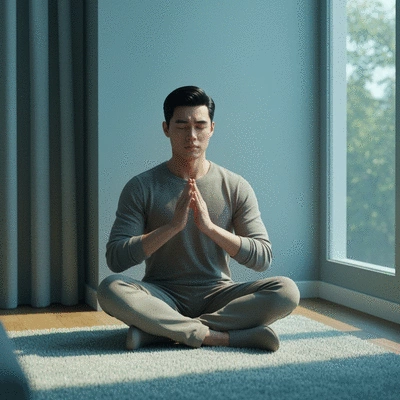
Mindfulness for Anxiety and Depression
Have you felt the weight of anxiety pressing down on you? You're not alone. Mindfulness could be the gentle push you need to lift that weight and embrace a clearer mind. Let's dive into the transformative power of this practice.
What You Will Learn
- Mindfulness is about being fully present and engaged in the moment without judgment.
- Practicing mindfulness can significantly reduce anxiety and depression by breaking the cycle of negative thoughts.
- Incorporating self-compassion into mindfulness enhances emotional balance and resilience.
- Long-term benefits of mindfulness include improved mood, emotional resilience, and greater self-acceptance.
- Mindfulness is a journey that requires patience and should complement, not replace, professional mental health treatment.
- Understanding the science behind mindfulness can enhance your practice and coping strategies.
- Practical tips for sustaining a mindfulness practice include starting with short sessions and using guided meditations.
Mindfulness's Impact on Mental Health
Mindfulness offers a structured approach to improving mental well-being by addressing key aspects of mental health challenges.
Core Components of Mindfulness
- ✓ Awareness: Non-judgmental observation of thoughts.
- ✓ Presence: Engaging fully with the current moment.
- ✓ Acceptance: Embracing experiences as they come.
Benefits for Anxiety & Depression
- ✓ Reduced stress levels.
- ✓ Improved emotional regulation.
- ✓ Greater self-acceptance.
Mindfulness Meditation Techniques
- ✓ Guided meditations.
- ✓ Body scans.
- ✓ Mindful breathing.
Role of Self-Compassion
- ✓ Increased resilience.
- ✓ Improved self-esteem.
- ✓ Greater emotional balance.
Understanding Mindfulness and Its Role in Mental Health
Have you ever found yourself caught in a whirlwind of thoughts, feeling overwhelmed by daily pressures? Mindfulness offers a gentle anchor in these turbulent moments, helping us navigate our mental landscape with grace and clarity. At iFit Magazine, we believe understanding mindfulness is essential for fostering better mental health, especially as we face the complexities of life today.

So, what exactly is mindfulness? It's a practice of being fully present in the moment, acknowledging our thoughts, feelings, and surroundings without judgment. This simple yet profound approach allows us to cultivate a sense of peace and awareness that can significantly impact our mental well-being.
Defining Mindfulness: What It Is and How It Works
Mindfulness is more than just a buzzword; it's a way of life that encourages us to engage with each moment. By focusing on our breath or the sensations in our body, we can step away from the chaos of our thoughts. This practice can be cultivated through various methods, including meditation, breathing techniques, and mindful walking. Here are some key components of mindfulness:
- Awareness: Paying attention to our thoughts and feelings without labeling them as good or bad.
- Presence: Engaging fully with the current moment, rather than dwelling on the past or worrying about the future.
- Acceptance: Embracing our experiences as they come, allowing for emotional flow and resilience.
By incorporating these elements, we can create a more balanced state of mind that contributes to overall wellness.
The Connection Between Mindfulness, Anxiety, and Depression
Many individuals struggle with anxiety and depression, often feeling trapped in a cycle of negative thoughts. Research shows that mindfulness can be a powerful tool in breaking this cycle. By learning to observe our thoughts without attachment, we can reduce the intensity of our emotional responses. This practice encourages a shift in perspective, allowing us to face challenges with a sense of calm.
Some benefits of mindfulness in relation to anxiety and depression include:
- Reduced stress levels
- Improved emotional regulation
- Greater self-acceptance
As we embrace these benefits, we can find pathways to healing and resilience.
Mindfulness Meditation: Techniques and Benefits
Meditation is a cornerstone of mindfulness practice. It's a dedicated time to focus inward and cultivate awareness. There are various techniques you can explore, such as:
- Guided meditations
- Body scans
- Mindful breathing
Each technique offers unique benefits that can enhance your mental health journey. For instance, guided meditations can provide structure for beginners, while body scans promote relaxation and connection to the present moment.
Exploring the Role of Self-Compassion in Mindfulness
Self-compassion plays a crucial role in mindfulness, allowing us to treat ourselves with kindness during difficult times. When we practice self-compassion, we acknowledge our struggles without harsh judgment. This approach can foster a sense of connection to ourselves and others. Embracing self-compassion while practicing mindfulness can lead to:
- Increased resilience
- Improved self-esteem
- Greater emotional balance
Incorporating self-compassion into our mindfulness practices can significantly enhance our mental health, paving the way for a more fulfilling life.
Interactive Poll: How Do You Practice Mindfulness?
We'd love to hear from you! How do you incorporate mindfulness into your daily routine? Choose one of the options below:
Summarizing the Benefits of Mindfulness for Anxiety and Depression
Have you ever felt overwhelmed by stress or anxiety? You're not alone! Many people experience these feelings, but incorporating mindfulness into your routine can bring about significant changes. Mindfulness practices have been shown to reduce symptoms of anxiety and depression effectively, offering a pathway to improved mental health.
Research highlights that by engaging in mindfulness, individuals can develop a greater awareness of their thoughts and feelings. This awareness can lead to a more balanced emotional state, allowing you to navigate the ups and downs of life with greater ease.

The Potential for Long-Term Mental Health Improvements
One of the most exciting aspects of mindfulness is its potential for long-term benefits. By practicing mindfulness regularly, individuals can experience lasting improvements in their mental health. Here are some key benefits:
- Enhanced emotional resilience
- Reduced anxiety levels
- Improved mood and overall well-being
- Increased self-awareness and self-acceptance
These benefits can create a ripple effect, positively impacting various areas of your life, from relationships to work performance. Just imagine waking up each day feeling empowered and grounded!
Understanding Risks and Misconceptions About Mindfulness Practices
While mindfulness can be transformative, it's essential to approach it with a clear understanding. One common misconception is that mindfulness is a quick fix for mental health issues. In reality, mindfulness is a journey that requires practice and patience. It's important to recognize that:
- Mindfulness may not work for everyone immediately.
- It should not replace professional mental health treatment when needed.
- Some individuals may feel discomfort as they confront their thoughts during practice.
Being aware of these aspects can help you set realistic expectations as you embark on your mindfulness journey.
The Value of Psychoeducation in Mindfulness
Understanding the principles behind mindfulness is crucial for effective practice. This is where psychoeducation comes in. By learning about the science of mindfulness, you can:
- Recognize the effects of stress on your body and mind
- Develop coping strategies for challenging situations
- Enhance your mindfulness practice through informed choices
Psychoeducation empowers you, providing the knowledge needed to fully embrace mindfulness as part of your overall wellness strategy. At iFit Magazine, we believe in equipping you with the right tools and information to foster resilience and mental clarity.
FAQ: Mindfulness for Anxiety and Depression
- What is mindfulness?
- Mindfulness is the practice of being fully present in the moment, observing thoughts, feelings, and sensations without judgment. It helps cultivate peace and awareness.
- How does mindfulness help with anxiety and depression?
- Mindfulness helps by breaking the cycle of negative thoughts, reducing stress levels, improving emotional regulation, and fostering greater self-acceptance.
- What are some common mindfulness meditation techniques?
- Common techniques include guided meditations, body scans, and mindful breathing exercises, each offering unique benefits for mental well-being.
- What is the role of self-compassion in mindfulness?
- Self-compassion encourages treating oneself with kindness, acknowledging struggles without judgment. It enhances resilience, self-esteem, and emotional balance within mindfulness practice.
- Can mindfulness replace professional mental health treatment?
- No, mindfulness should complement professional mental health treatment, not replace it. It is a powerful tool for self-management but not a standalone cure for severe conditions.
- What are the long-term benefits of practicing mindfulness?
- Long-term benefits include enhanced emotional resilience, reduced anxiety, improved mood, overall well-being, and increased self-awareness and self-acceptance.
- How can I maintain a sustainable mindfulness practice?
- Start with short daily sessions, find a quiet space, use guided meditations or apps, and set regular reminders. The key is to integrate it naturally into your routine.
Encouraging Action: Your Path to Mindfulness
Now that we've covered the benefits and understanding of mindfulness, it's time to take action! Integrating mindfulness into your daily routine can be a game-changer for your mental health. Let's explore some effective methods to maintain a sustainable mindfulness practice.
How to Maintain a Sustainable Mindfulness Practice
Creating a consistent mindfulness practice doesn't have to be daunting. Here are some practical tips:
- Start with just a few minutes each day.
- Find a quiet space where you feel comfortable.
- Use guided meditations or mindfulness apps to get started.
- Set reminders to practice mindfulness regularly.
Remember, the goal is to incorporate mindfulness in a way that feels natural and supportive for you.
Resources for Further Learning and Support
As you embark on your mindfulness journey, consider exploring these resources:
- Books on mindfulness and mental health
- Online courses that focus on mindfulness techniques
- Local workshops or community classes
These resources can provide you with insights and techniques to deepen your practice and enhance your mental well-being.
Exploring Wellness Programs That Incorporate Mindfulness
Many wellness programs now include mindfulness as a core component. Whether you’re interested in yoga, meditation, or holistic health, these programs can offer a supportive environment for your mindfulness practice. Look for:
- Retreats focused on mindfulness and wellness
- Community centers that offer classes
- Online platforms providing structured mindfulness programs
By integrating mindfulness into these programs, you can cultivate a richer, more fulfilling experience that addresses both your mental and physical health. Let’s embrace this journey together and unlock the transformative power of mindfulness!
Recap of Key Points
Here is a quick recap of the important points discussed in the article:
- Mindfulness is the practice of being fully present in the moment, which can improve mental well-being.
- Key components of mindfulness include awareness, presence, and acceptance.
- Mindfulness can significantly reduce symptoms of anxiety and depression.
- Incorporating techniques like meditation and self-compassion enhances mindfulness practices.
- Regular mindfulness practice leads to long-term mental health benefits, including improved emotional resilience and self-awareness.
- Being aware of the risks and misconceptions surrounding mindfulness helps set realistic expectations.
- Engaging in psychoeducation empowers individuals to better integrate mindfulness into their lives.
- Practical tips for maintaining a sustainable mindfulness practice include starting small, finding a quiet space, and using resources like apps and guided meditations.





Choosing the Right Fitness App
Flavorful Low-Salt, Low-Sugar Recipes
Functional Fitness for Better Balance
Family Fitness: Inspiring Success Stories
From Loss to Hope: Resilience